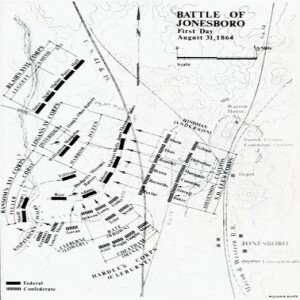
On this day in labor history, the year was 1864.
That was the day the final battle of the Atlanta Campaign began with the Battle of Jonesborough.
The Union had been embroiled in a civil war with Confederate forces to end the slave labor system for three and a half years.
It had been a difficult summer.
Battles were increasingly bloody, with casualties on both sides numbering in the tens of thousands.
Criticisms intensified against key Union generals like Sherman and Grant.
Pressure mounted against President Lincoln to end the war and withdraw the Emancipation Proclamation if necessary.
General William T. Sherman mounted the Atlanta Campaign earlier that year, in May.
His forces scored a number of victories throughout the summer, but could not decisively defeat Confederate forces.
By August, Northern morale was so low that the Republican National Committee deemed Lincoln unelectable.
The Democratic National Convention, convening in Chicago, had declared the war a failure and planned to ride to victory over Lincoln in the November elections.
But Lincoln’s commitment to emancipation was unwavering.
And Sherman did not disappoint.
He understood that Atlanta was, as historian Eric Foner describes it, “a key railroad hub and the communications and transportation center for the entire Southeast.”
Sherman’s forces had been marching down from Chattanooga for most of the summer.
Finally, they marched to the south of Atlanta to cut the last key rail line.
On this day, Union forces positioned themselves at the Flint River and at the Macon and Western Railroad.
Over the next two days, they would successfully beat back multiple Confederate assaults, destroy the rail line and force Confederate forces to abandon Atlanta.
The city was now fully under Union occupation.
More Episodes
 2024-11-08
2024-11-08
 2024-11-06
2024-11-06
 2024-11-05
2024-11-05
 2024-11-04
2024-11-04
 2024-11-03
2024-11-03
 2024-11-02
2024-11-02
 2024-11-01
2024-11-01
 2024-11-01
2024-11-01
 2024-11-01
2024-11-01
 2024-11-01
2024-11-01
 2024-11-01
2024-11-01
 2024-11-01
2024-11-01
 2024-10-21
2024-10-21
Create your
podcast in
minutes
- Full-featured podcast site
- Unlimited storage and bandwidth
- Comprehensive podcast stats
- Distribute to Apple Podcasts, Spotify, and more
- Make money with your podcast
It is Free
- Privacy Policy
- Cookie Policy
- Terms of Use
- Consent Preferences
- Copyright © 2015-2024 Podbean.com




